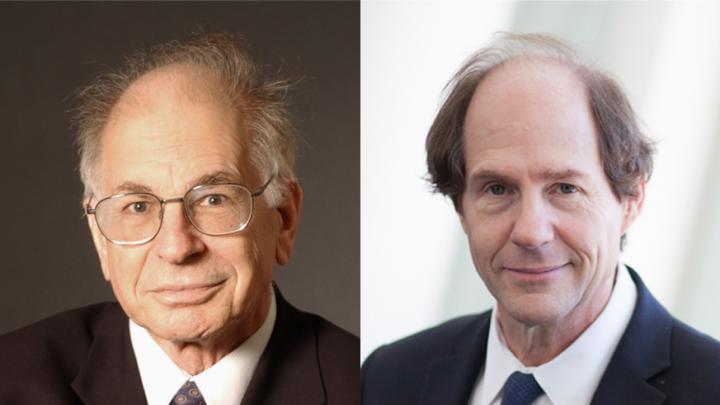Intuition, happiness, and memory were the topics on the table Monday night as Princeton psychologist Daniel Kahneman, LL.D. ’04, discussed his work on human judgment and cognitive bias, which won him a share of the 2002 Nobel Prize in economics. In conversation with Walmsley University Professor Cass Sunstein, Kahneman considered implications of and modifications to his theory of heuristics—the trial-and-error process of learning—popularized in his 2011 bestseller, Thinking, Fast and Slow.
The work began, said Kahneman, as “a series of accidents.” At Hebrew University of Jerusalem, fellow researcher Amos Tversky told Kahneman about some research on decisionmaking that suggested human behavior was reasonably rational, displaying a good intuitive grasp of statistics—a conclusion that seemed to contradict Kahneman’s own experiences. The ensuing discussion led to a lengthy collaboration, as the two delved into the realities of how people assign probabilities to events and think when facing uncertainty. That research would prove formative for the modern field of behavioral economics. (Tversky, who died in 1996, was ineligible to share the Nobel Prize.)
“When you try to answer a question,” said Kahneman, “you sometimes answer a different question.” In a seminal 1979 paper, he and Tversky described a series of experiments that questioned the classical economic assumption of “homo economicus,” a rational actor motivated by self-interest. In its place, they defined what they termed prospect theory, a description of the mental shortcuts, or heuristics, that guide people’s everyday decisions, as well as the systematic biases that could result from them. “A heuristic,” Kahneman explained, “is just answering a difficult question by answering an easy one.” When asked, for instance, the number of divorces at one’s university, one might substitute the question of how easy it is to think of examples of divorces, a heuristic Kahneman and Tversky dubbed “availability.” “Evaluation happens in a fraction of a second,” Kahneman said. Reflecting on this theory’s place in the history of psychology, he noted, “In the last 20 years, [psychologists] have rediscovered the unconscious…but it didn’t come from Freud. It came from experimental psychology.”
Kahneman added several new heuristics to the original three—availability, representativeness, and framing—that he and Tversky had initially defined. The “affect” heuristic, a measure of emotion, is central to how people make decisions regarding issues like genetically modified organisms or endangered wildlife: emotions circumvent rational cost-benefit analysis. He also called into question the “framing” heuristic, which describes how people’s answers can be influenced by irrelevant numbers; for instance, he and Tversky had observed that subjects who were asked whether the tallest redwood was taller or shorter than 1,200 feet gave different answers when the reference point was changed to 80 feet. While acknowledging that the exact classification of the “framing” phenomenon was a matter of “inside baseball,” Kahneman said his own thinking had changed. He argued that framing was a more deliberate, strategic mechanism than the genuinely intuitive heuristics; it “doesn’t fit the description of substituting something for something else.”
Similar heuristics affect people’s perceptions of happiness, Kahneman continued. Rather than remembering the entirety of an experience, he said, people rate their overall happiness based on their moment of peak happiness and their emotional state at the experience’s end. Early on, he sought to explore this conundrum; he used “experience sampling” techniques developed in other fields to ask subjects to rate their happiness in real time—using, for instance, phone surveys asking, “How happy are you right now?”—rather than relying on retrospective evaluations. “I thought this was really the most important,” he recalled. “Whether people are happy in their life is more important than how happy they are when they think about their life.” But his opinion has changed; he now thinks that retrospective impressions also influence decisionmaking. “It turns out that when people make plans for the future, they’re not trying to maximize the quality of their [actual] experience,” he said. “In a way, when you think about the future, you’re maximizing the quality of your anticipated memories.”
In response to audience questions—several hundred people filled Harvard Business School’s Burden Auditorium to hear the psychologist speak—Kahneman affirmed his support for applying behavioral economics to public policy, an approach championed by Sunstein and University of Chicago economist Richard Thaler in their book Nudge: Improving Decisions about Health, Wealth, and Happiness. “We don’t know much,” Kahneman acknowledged, “but we know a few things, and we know a few things that can be good to use.”
In his own life, though, the scholar admitted that he is as prone to cognitive biases and errors of judgment as anyone else. “When we were studying biases and errors of judgment, we were studying our own,” he said. With humorous regret, he added, “I’ve been doing that for 25 years now, and I think I haven’t improved at all.”
For more on recent research in behavioral economics, see “The Marketplace of Perceptions,” a feature article from the Harvard Magazine archives.







